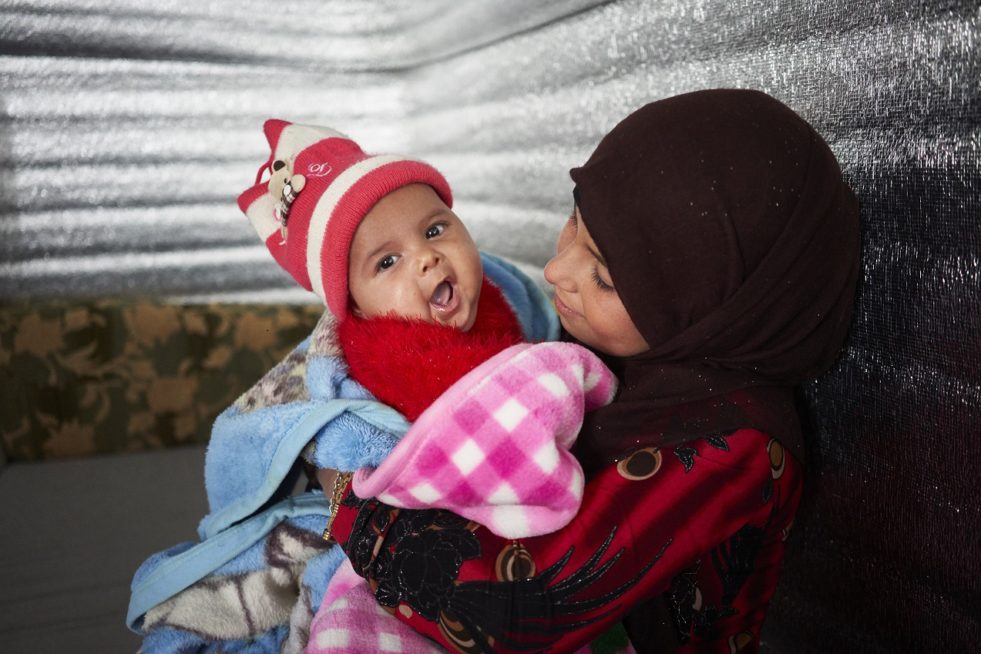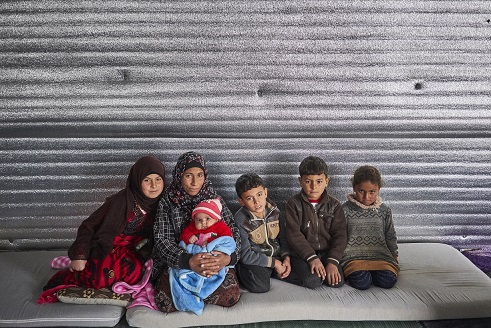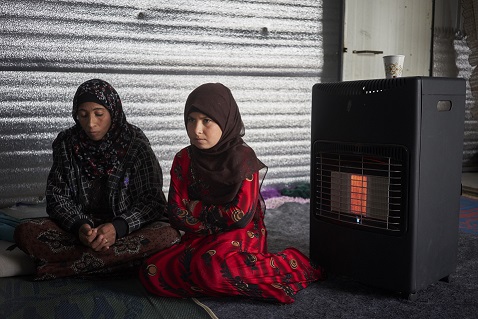
Syrian refugee Alaa, 11, holds her two-month-old infant sister Muna at their shelter in Azraq refugee camp, Zarqa Governorate, Jordan. The family received winterization assistance from UNHCR in the form of insulation material and a gas heater. © UNHCR/David Azia
AZRAQ CAMP, JORDAN— As a small heater radiates warmth in her shelter, Wardah recalled the brutal reality of winter just a couple of years ago that left her family battling the harsh elements – and for survival.
She cast her mind back to the airstrikes and shelling in her native Syria which left their neighbourhood devastated and her family traumatized.
“When we heard the sound of the aircraft passing above our house, all of us would put our hands over our ears and wait for it to pass,” she recalled seated alongside her sons Abdallah 9, Abd Alrahaman, 7, and daughters Alaa, 11, Rajaa, 5, and newborn Muna, 2 months.
“Sometimes it would happen at night and we wouldn’t be able to sleep. The kids would cry a lot and be very scared”
Wardah and her family arrived at midnight at the Jordanian border in February of 2016, clad in one outfit with just one other change of clothes in tow – and one blanket.
“It was very tough because when we arrived, we went 48 hours without any food,” recalled Wardah.
“Families that arrived before us, helped us and provided us with blankets. I made a small tent from these blankets and that was all the protection and shelter we had for an entire month.”
“May God help the people living there, under the same hard conditions. I feel very sorry for them.”

(From left) Syrian refugee Alaa, 11, her mother Wardah, two-month-old infant sister Muna, brothers Abdallah, 9, Abd Alrahman, 7, and sister Rajaa, 5, sit in their shelter in Azraq refugee camp, Zarqa Governorate, Jordan. The family received winterization assistance from UNHCR in the form of insulation material and a gas heater. © UNHCR/David Azia
Now at Azraq Camp, UNHCR has helped to supply the family with the essentials so sorely needed to stay warm as the temperature dips.
“They gave us mattresses and ground mats. They gave us blankets of course, and provided the insulation that you see in the caravan to protect us from the cold,” said Wardah. “They also gave warm clothes for us and for the kids.”
UNHCR has been distributing winter assistance to vulnerable Syrian refugees like Wardah in both Zaatari and Azraq camps in Jordan reaching more than 24,000 families as of the end of December 2017. Support has come in the form of in-kind and cash assistance, such as money for gas to cover the cost of refills and for shelter maintenance.
Wardah said there is still a considerable amount they need in terms of supplies such as additional mats and winter essentials to cope with the cold. But they are appreciative of the goods they have to stay sheltered against the elements.
“We’re grateful,” said Wardah. “Winter here is difficult, but it’s still better than Syria. However, the caravans are very cold. We can get the heaters running for five days and then we run out. It doesn’t get warm enough. It’s hard especially for the little kids. They sit in front of the heater and don’t leave it.”

Syrian refugee Alaa, 11, right, and her mother Wardah sit next to their gas heater in their shelter in Azraq refugee camp, Zarqa Governorate, Jordan. The family received winterization from UNHCR assistance in the form of insulation material and a gas heater. © UNHCR/David Azia
In addition to refugees in Jordan like Wardah, UNHCR’s winterization programme has reached more than 3.1 million Syrians and Iraqis as of the end of December 2017. Despite the generous contributions, the funding falls short of the total of 3.81 million UNHCR has deemed among the most vulnerable, which includes Syrian and Iraqi internally displaced persons, as well as refugees in countries including Syria, Turkey, Lebanon, Jordan, Iraq and Egypt.
While the family has found safe haven in Jordan, Wardah still longs for the home and their homeland they were forced to leave behind.
“Although the weather was tough in winter, we had our own house and winter essentials. We would use handmade blankets that are thicker and warmer than the ones we have here,” she said. “We would use fuel heaters that would keep us warmer than the gas heaters we have here”
The distance from Syria hasn’t impacted Wardah’s desire to uphold long-held traditions. If anything, it has reinforced the need for fostering togetherness with her loved ones.
“We want to keep our family united. We always strive to be together with the kids and the relatives. We want to maintain that bond.” said Wardah.
Despite being forced to flee her home under unimaginably tough conditions, Wardah remains optimistic and hopeful for better days ahead.
“First, I wish that the situation in Syria goes back to normal so that we can return to our country. My second wish is for my children to finish their school because the most important thing is for them to get an education.”



